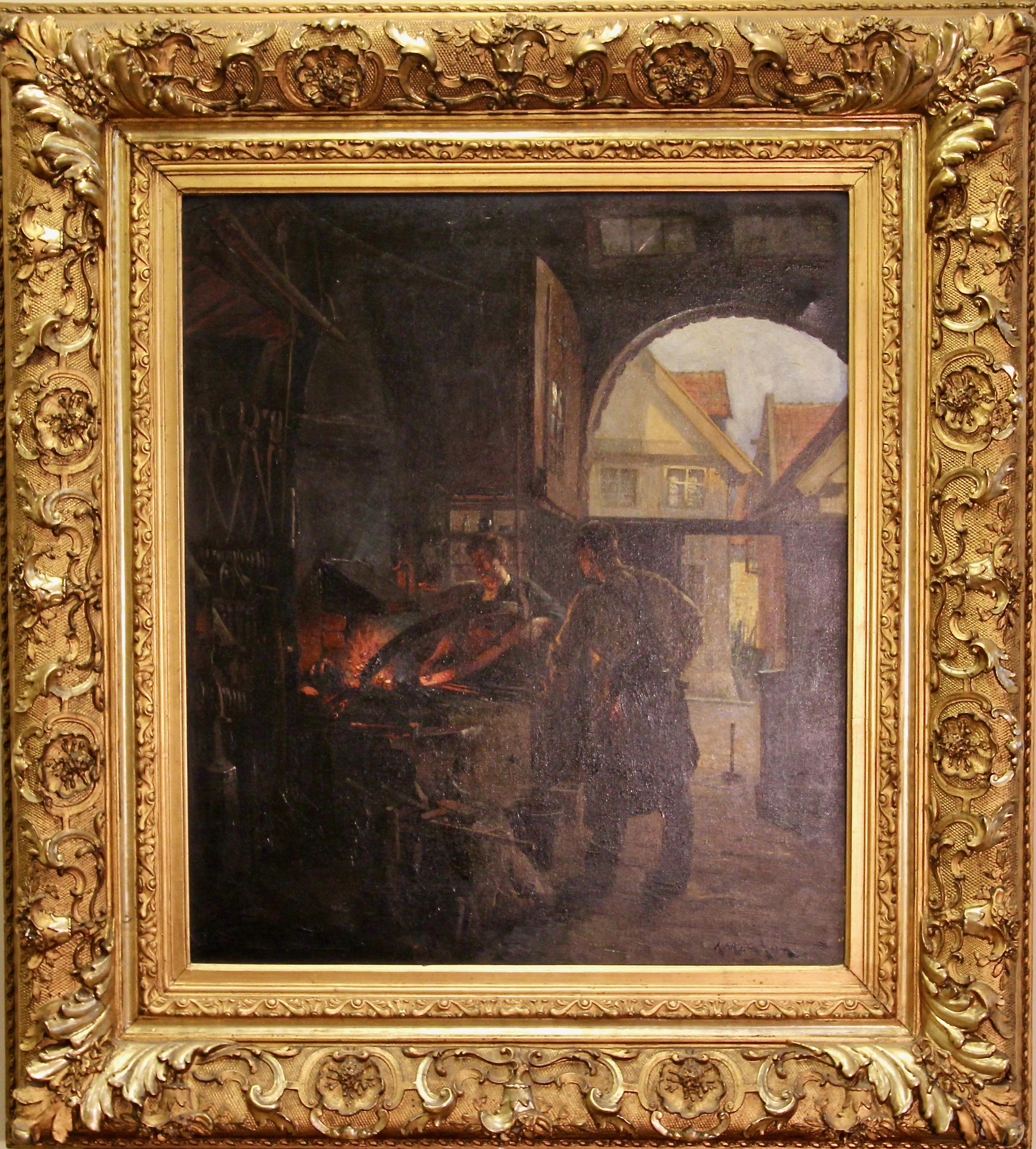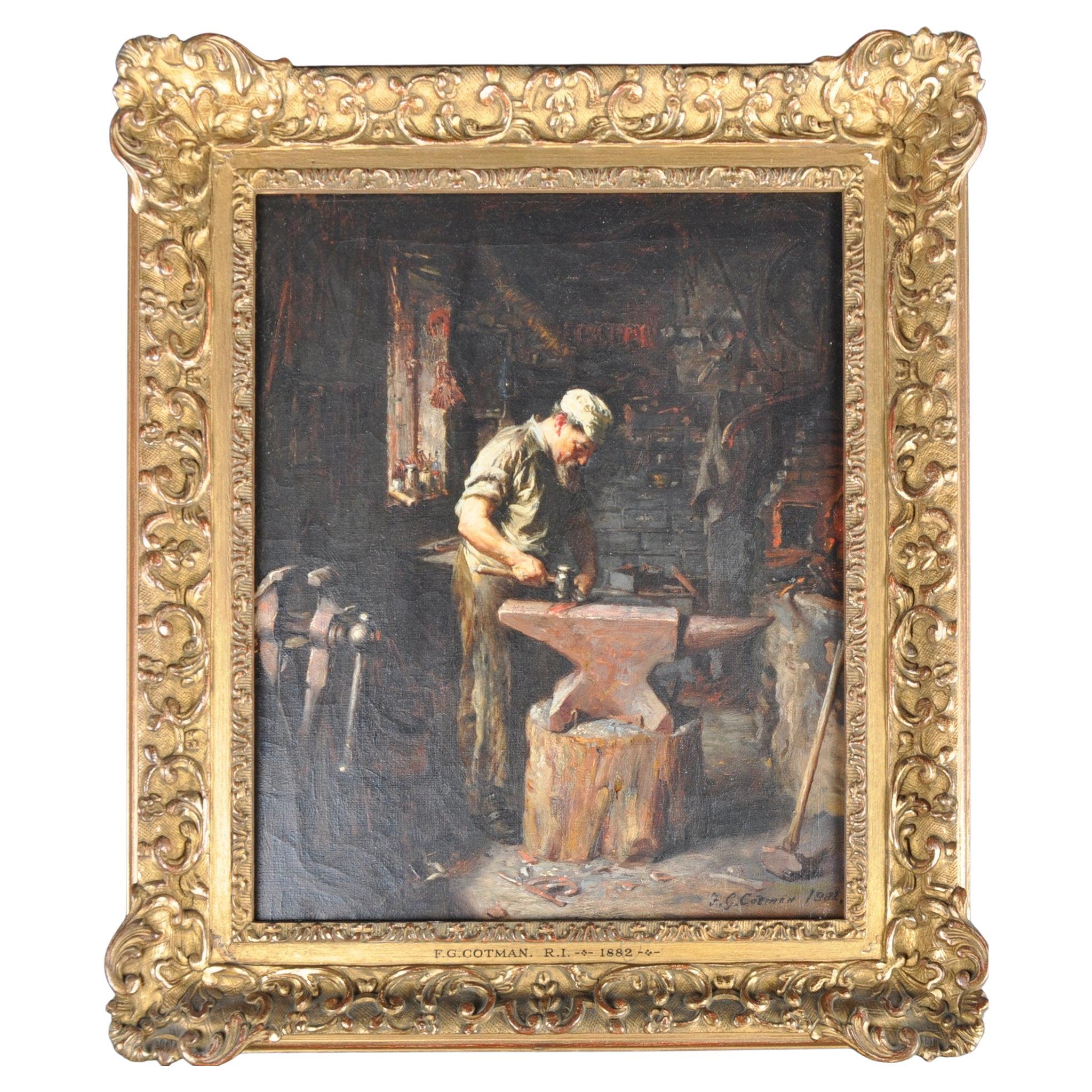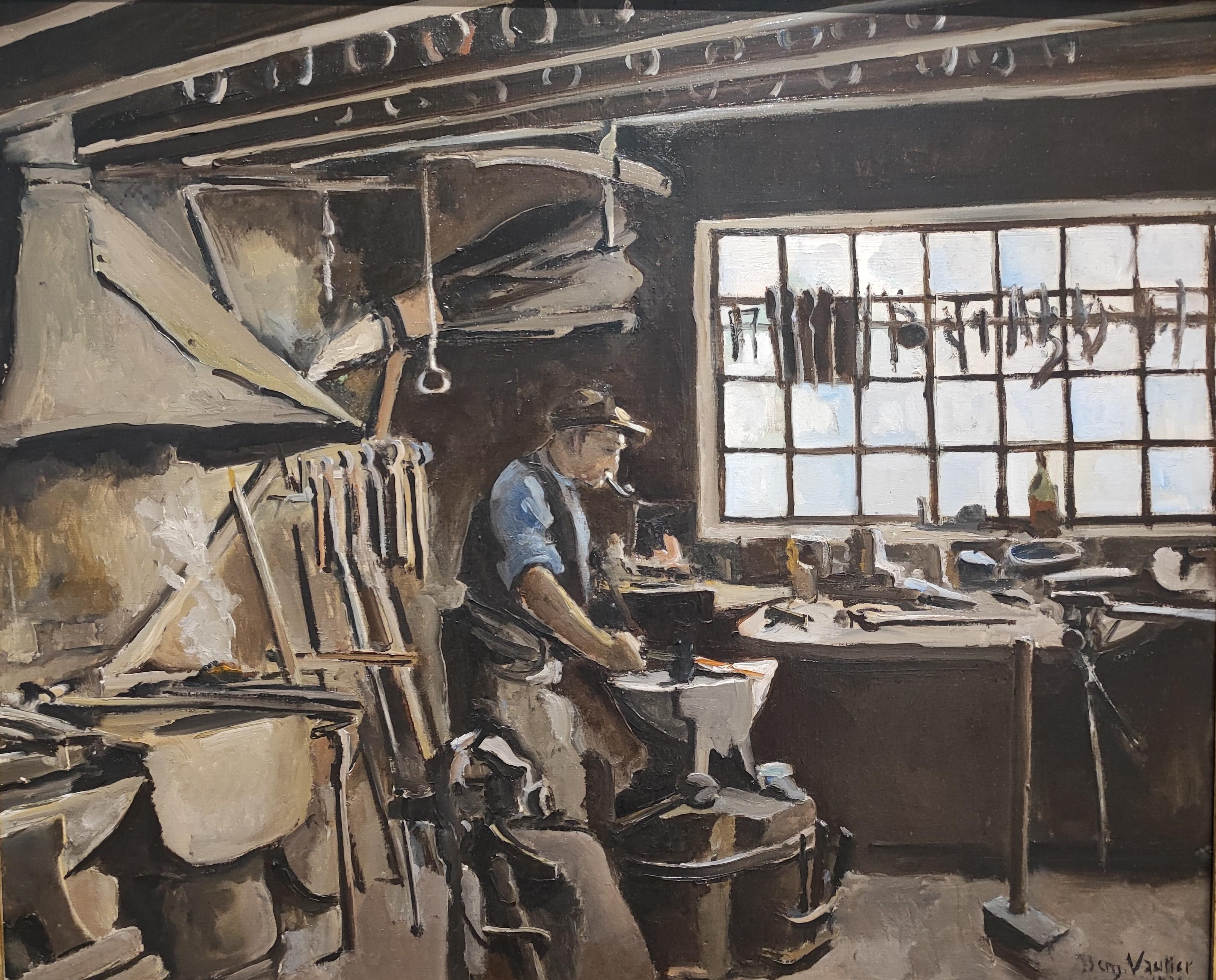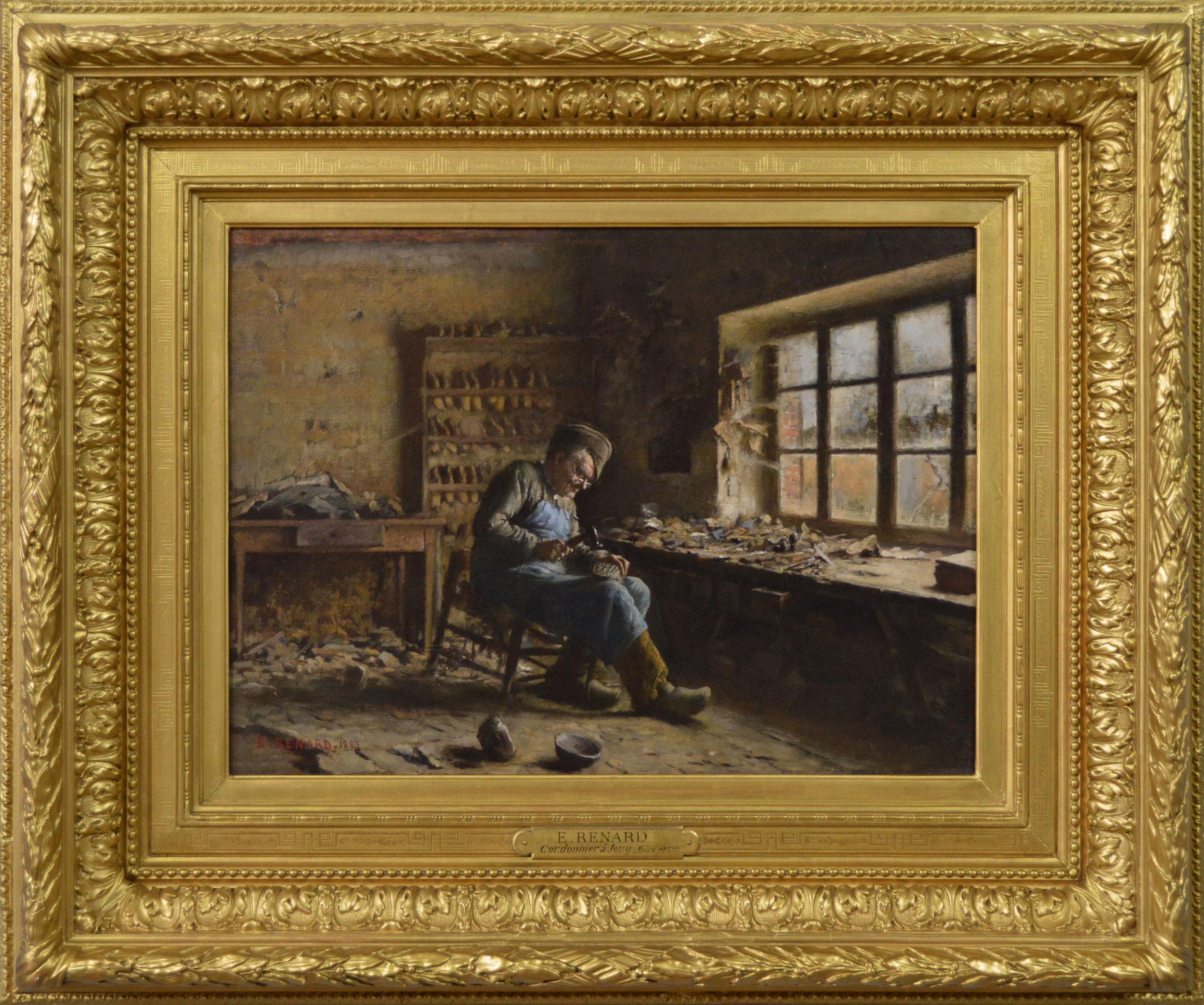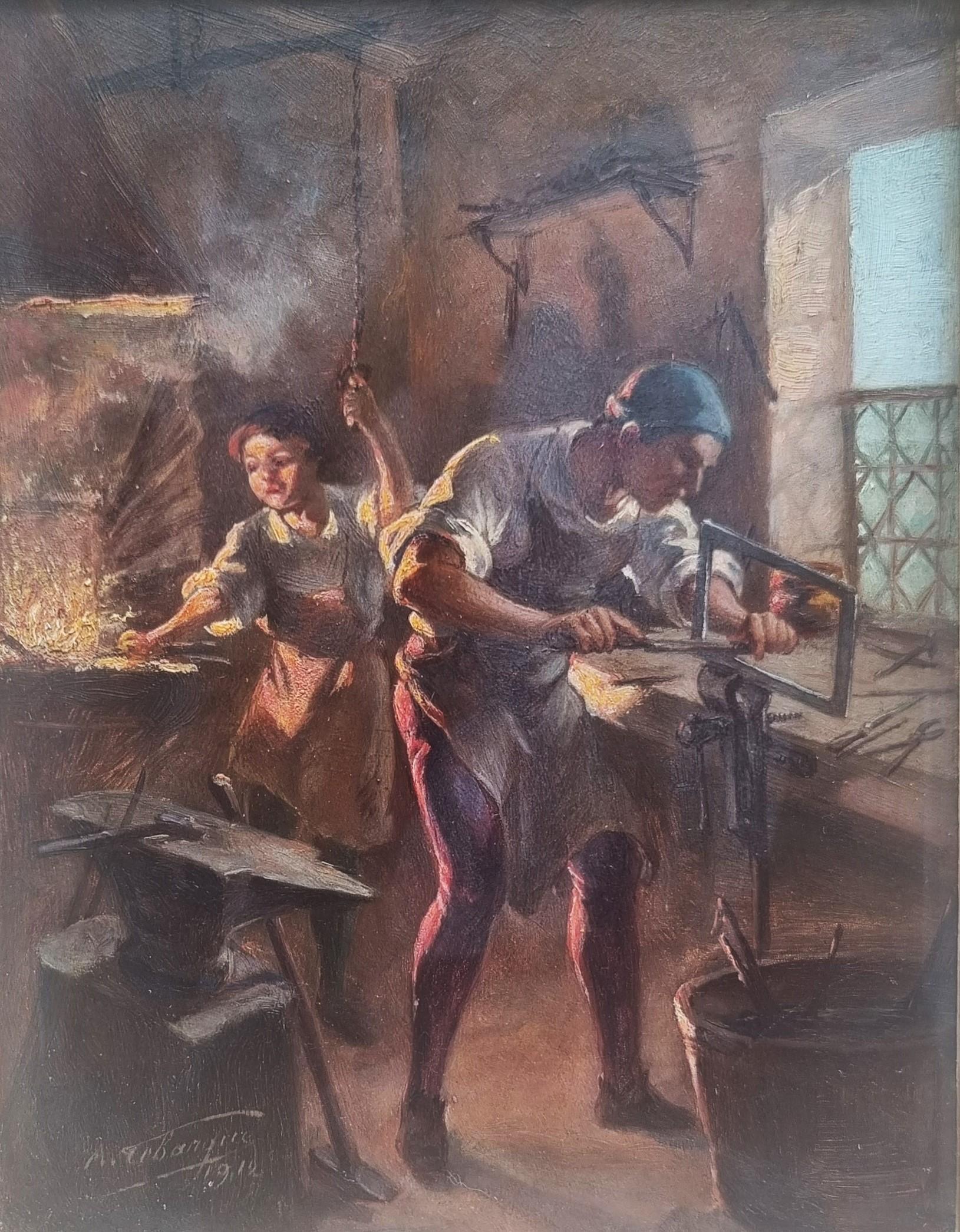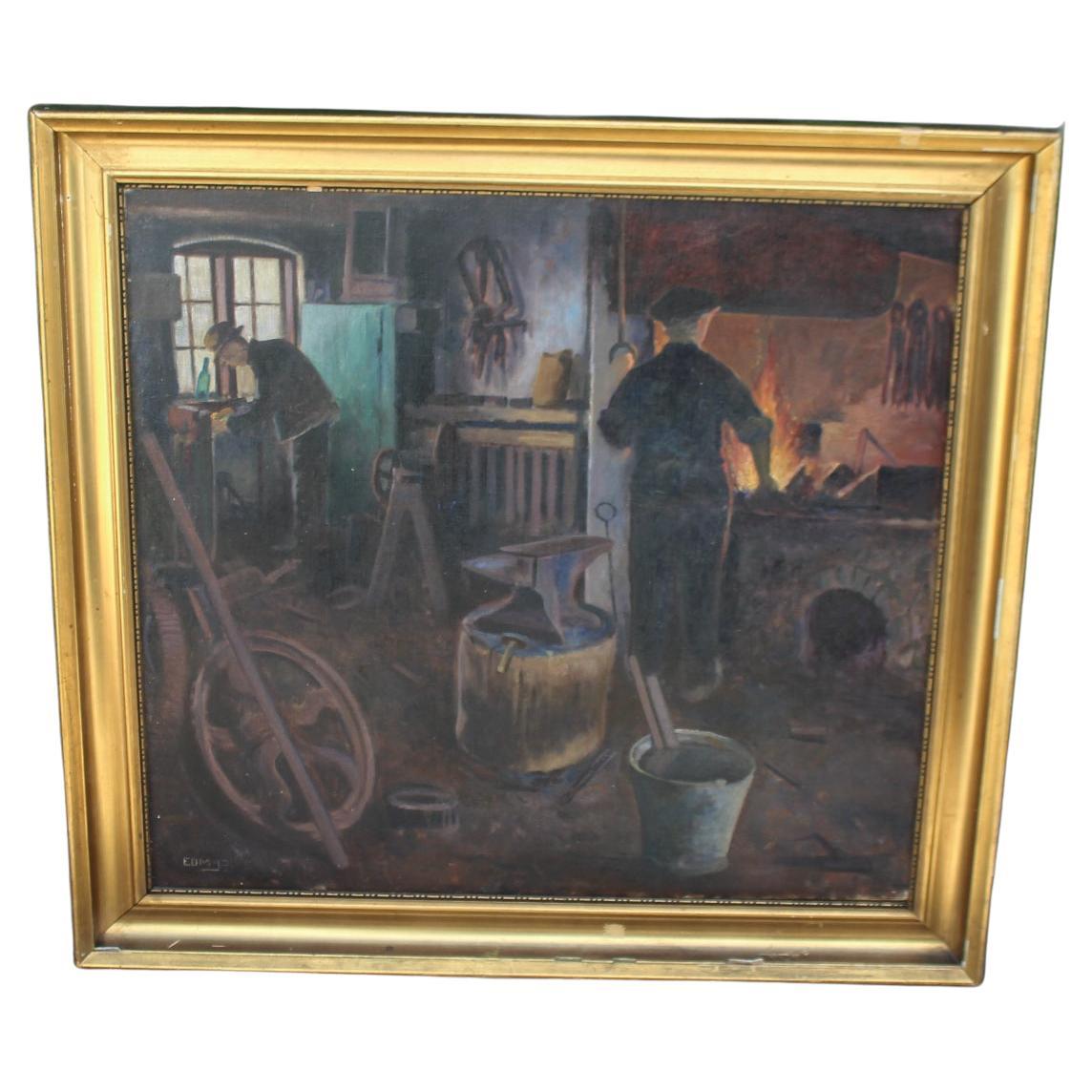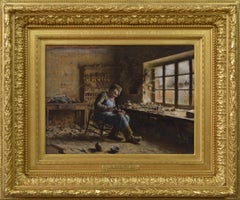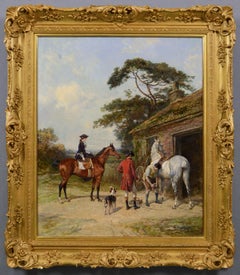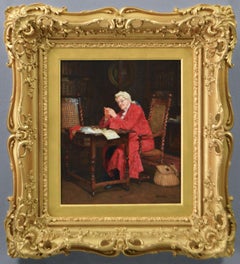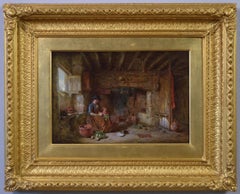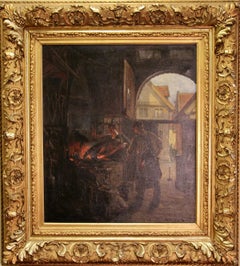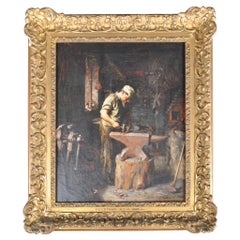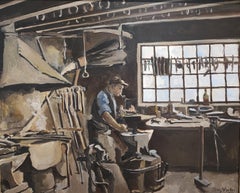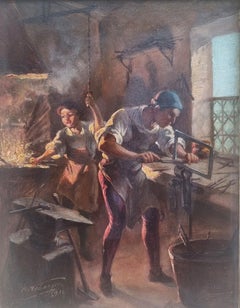Items Similar to 19th Century genre oil painting of a blacksmith at a forge
Want more images or videos?
Request additional images or videos from the seller
1 of 14
Hermann Armin Kern19th Century genre oil painting of a blacksmith at a forge1898
1898
$6,775.53
£4,900
€5,772.80
CA$9,387.84
A$10,187.24
CHF 5,398.34
MX$124,941.53
NOK 66,804.06
SEK 63,126.30
DKK 43,096.80
About the Item
Hermann Armin Kern
Hungarian (1839-1912)
The Blacksmith
Oil on canvas, signed & dated 1898, with wax seal to reverse
Image size: 16 inches x 20.25 inches
Size including frame: 23.5 inches x 27.75 inches
Provenance: Chalkway House, Ebbesbourne Wake
A wonderful genre painting of a blacksmith at a forge by Hermann Armin Kern. A grey haired man can be seen standing near an anvil wearing a cap and green work apron. In one hand he holds a hammer and in the other a glass of ale. Behind him, the fire from the forge casts a vermillion glow within the workshop. Kern has used ‘Chiaroscuro’, the contrast of light and dark, to create a greater depth to the painting, allowing the viewer to be drawn into the scene.
Hermann Armin Kern or Hermann Armin von Kern was a genre and portrait painter born in Liptovar, Hungary in 1839. He showed an early talent for art and in 1854 left home to go to Prague, where he studied under the portrait painter Jozef Božetech Klemens (1817-1883). He later travelled to Vienna where he enrolled at the Academy of Fine Arts and was taught by Carl Rahl (1812-1865). Kern was keen to develop his artistic talent further and in 1867 left Vienna to study in Düsseldorf, Germany after winning a scholarship. By 1870, he had moved to Munich where he attended Academy of Fine Arts, studying under the realist painter Karl von Piloty (1826-1886). Whilst there, he met fellow artist Franz von Defregger (1835-1921) who became his friend.
After finishing his training, Kern moved to Paris for a time before returning to Vienna around 1877 where he married Pauline Hampel. They lived at 5 Favoritenstrasse and went on to raise 10 children together. One of his daughters, Pauline von Kern (1878–1939) also became an artist. He made his debut exhibition in Vienna in 1880 and also began exhibiting in Munich. His work attracted the attention of Emperor Franz Joseph I who appointed him court painter. In 1885, he was commissioned to paint the ceiling decoration of the Szeged Theatre. He remained in Vienna until his death in 1912 at Maria Enzesdorf.
Kern became well known for his charming scenes of characters in taverns, interiors and street scenes. Many of his subjects featured elderly men involved in domestic chores or enjoying simple pleasures, such as this fine example. A number of his paintings can be found in UK public collections including the Mercer Art Gallery and Touchstones Rochdale as well as internationally at the Grohmann Museum in Milwaukee and the Musée d’Orsay, France.
Presentation: The painting is housed in a new, English made gilt frame which is in excellent condition. The reverse bears a wax seal and also has an old label, possibly from a private collection or exhibition (see images).
Condition: As with all of our original antique oil paintings, this work is offered in ready to hang gallery condition, having been professionally cleaned, restored and revarnished.
© Benton Fine Art
- Creator:Hermann Armin Kern (1839 - 1912)
- Creation Year:1898
- Dimensions:Height: 23.5 in (59.69 cm)Width: 27.75 in (70.49 cm)Depth: 3 in (7.62 cm)
- Medium:
- Movement & Style:
- Period:
- Condition:
- Gallery Location:Nr Broadway, GB
- Reference Number:1stDibs: LU156216435362
About the Seller
5.0
Platinum Seller
Premium sellers with a 4.7+ rating and 24-hour response times
Established in 1972
1stDibs seller since 2015
344 sales on 1stDibs
Typical response time: <1 hour
Associations
The British Antique Dealers' AssociationLAPADA - The Association of Arts & Antiques DealersInternational Confederation of Art and Antique Dealers' Associations
- ShippingRetrieving quote...Shipping from: Nr Broadway, United Kingdom
- Return Policy
Authenticity Guarantee
In the unlikely event there’s an issue with an item’s authenticity, contact us within 1 year for a full refund. DetailsMoney-Back Guarantee
If your item is not as described, is damaged in transit, or does not arrive, contact us within 7 days for a full refund. Details24-Hour Cancellation
You have a 24-hour grace period in which to reconsider your purchase, with no questions asked.Vetted Professional Sellers
Our world-class sellers must adhere to strict standards for service and quality, maintaining the integrity of our listings.Price-Match Guarantee
If you find that a seller listed the same item for a lower price elsewhere, we’ll match it.Trusted Global Delivery
Our best-in-class carrier network provides specialized shipping options worldwide, including custom delivery.More From This Seller
View All19th Century genre oil painting of a French cobbler at work
Located in Nr Broadway, Worcestershire
Émile Renard
French, (1850-1930)
Cordonnier à Jouy, Eure-et-Loir (Cobbler of Jouy)
Oil on canvas, signed & dated 1883
Image size: 12.75 inches x 17.5 inches
Size including frame: 23.5 inches x 28.25 inches
A realist painting of a cobbler in his workshop by Émile Renard. The composition features an elderly shoemaker seated on a rickety chair next to a bench. The light from a window illuminates his work.
Émile Henry...
Category
19th Century Figurative Paintings
Materials
Canvas, Oil
19th Century genre oil painting of a lady & gentleman at a blacksmith's
By Heywood Hardy
Located in Nr Broadway, Worcestershire
Heywood Hardy
British, (1842-1933)
A Visit to the Blacksmith’s
Oil on canvas, signed & dated 1902
Image size: 26.75 inches x 22 inches
Size including frame: 34.5 inches x 29.75 inches
Provenance: Willow Gallery, Duke Street, London
A wonderful painting of a lady and gentleman in 18th century costume visiting a blacksmith's by Heywood Hardy. To the left, a woman is shown sitting side saddle upon a bay horse, facing towards a blacksmith's forge. To her right, a man wearing a red coat and black hat watches on as a farrier shoes a grey horse. Meanwhile, a foxhound stands in the middle of the group, with its attention caught by the woman and her horse.
Heywood Hardy was born into an artistic family in Chichester, Sussex on the 25 November, 1842 to the portrait and genre painter James Hardy Snr (1801-1879) and his wife Elizabeth. His cousins Frederick Daniel Hardy...
Category
Late 19th Century Figurative Paintings
Materials
Canvas, Oil
19th Century genre oil painting of man preparing fishing tackle
By John Arthur Lomax
Located in Nr Broadway, Worcestershire
John Arthur Lomax
British, (1857-1923)
Preparing his Tackle
Oil on panel, signed
Image size: 11.75 inches x 9.75 inches
Size including frame: 21 inches x 19 inches
A fabulous genr...
Category
19th Century Victorian Paintings
Materials
Oil, Panel
19th Century genre oil painting of a woman & child in a Welsh cottage
Located in Nr Broadway, Worcestershire
Alfred Provis
British, (1818-1890)
By the Fireside
Oil on canvas, signed & dated 1869
Image size: 10.5 inches x 15.5 inches
Size including frame: 21.5 inches x 26.5 inches
This charming cottage scene by Alfred Provis features a woman preparing supper by a fire with her young daughter. As the mother peels the turnips and places them in the pot, the girl’s attention is drawn to the kitten feeding from a saucer. The dress and hat of the woman bears a similarity to those found Provis’s other scenes of Welsh cottage interiors. The artist was known to have visited North Wales around the time this painting was produced. In 1869, he exhibited a work entitled ‘Interior of a Welsh Farmhouse’ at the Royal Society of British Artists. Given the level of detail in the painting and the fact that it is in such an impressive original frame, it is possible this is the same painting as the one exhibited.
Alfred Provis was a genre painter born on 18 February, 1818 in Chippenham, Wiltshire. He was the son of John Provis, a timber merchant and his second wife Ann Banks. He spent time in London being tutored by the historical and portrait artist John Wood (1801-1870) before returning to Chippenham. He began exhibiting at the Royal Society of British Artists in 1843, continuing to exhibit there regularly until 1886. He made his debut at the Royal Academy in 1846 with a work entitled ‘A Cottage Door...
Category
19th Century Figurative Paintings
Materials
Canvas, Oil
19th Century historical military oil painting of a roundhead soldier
By Ernest Crofts
Located in Nr Broadway, Worcestershire
Ernest Crofts
British, (1847-1911)
On Guard
Oil on panel, signed & dated (18)79
Image size: 9.25 inches x 6.75 inches
Size including frame: 19.5 inches x 17 inches
A wonderful historical painting of a roundhead soldier standing outside a fortress by Ernest Crofts. The soldier is depicted wearing a back and breast plate over a red and yellow sleeved jacket tied with a sash around his waist. On his head, he wears a felt hat with red and white feathers and holds a sword in his hand. He is shown standing at the moated entrance of a fortified stone building with a portcullis. Beyond the raised portcullis, a group of soldiers can be seen in the shadows. The soldier’s uniform is typical of Cromwell’s famous ‘Ironside’ cavalry and indicates he is an officer, who, in Cromwell’s time would have earned his place based on merit rather than social status. The English Civil...
Category
19th Century Victorian Figurative Paintings
Materials
Panel, Oil
19th Century genre oil painting of a woman spinning wool
By Jonathan Pratt
Located in Nr Broadway, Worcestershire
Jonathan Pratt
British, (1835-1911)
Spinning Wool
Oil on canvas, signed
Image size: 12 inches x 17.75 inches
Size including frame: 17.25 inches x 23 inches
A pleasing genre paintin...
Category
19th Century Figurative Paintings
Materials
Canvas, Oil
You May Also Like
Oil Painting by Anders Montan, "In the Forge, Smithery, Blacksmith" 19th Century
Located in Berlin, DE
Very decorative oil painting by Anders Montan, in the forge, 19th century
Signed lower right. Famous Swedish artist.
Dimensions with frame: 104 cm x 11...
Category
19th Century Figurative Paintings
Materials
Canvas, Oil
$9,098 Sale Price
20% Off
ANTIQUE VICTORIAN FREDERICK GEORGE COTMAN 1882 OIL PAINTING OF A BLACKSMiTH
Located in West Sussex, Pulborough
Royal House Antiques
Royal House Antiques is delighted to offer for sale this stunning original 1882 dated Frederick George Cotman oil painting of a blacksmith
A well good looking and well made high Victorian painting, this really offers a window into another time and place
Frederick George Cotman (14 August 1850 Ipswich–1920) was an English painter of landscapes, portraits and interiors and a member of the Norwich School of painters
Frederick was born into the Cotman family of artists. His parents were Henry Edmund Cotman (1802–1871), formerly a Norwich silk merchant and his wife Maria Taylor (1813–1895). His elder brothers, Henry Edmund Cotman (1844–1914), and Thomas Cotman (1847–1925) were born in London before the family moved to Ipswich.
Frederick was born at 186 Wykes Bishop Street, Ipswich in 1850 and was the youngest child of the family. He was the nephew of John Sell Cotman and the cousin of John Joseph Cotman and Miles Edmund Cotman. He was a private pupil of William Thomson...
Category
Antique 1880s English Victorian Paintings
Materials
Wood
$2,855 Sale Price
30% Off
The blacksmith in his workshop
By Benjamin II Vautier
Located in Genève, GE
Work on canvas
Golden wooden frame
75 x 88.5 x 4 cm
Category
1930s Modern Interior Paintings
Materials
Oil
French Realist Painting Black smith workshop Old trade Early 20th
Located in PARIS, FR
Albert Léon LEBARQUE
Quatre-Champs (Ardennes), 1853 – Paris, 1939
The blacksmith's workshop
Oil on panel24 x 18 cm (34.5 x 28 cm with frame)
Signed and dated lower left “A. Lebarque ...
Category
1910s Realist Figurative Paintings
Materials
Oil
19th century Danish BlackSmiths Forge by Edvard Petersen
Located in Seaford, GB
Atmospheric Blacksmith Forge Interior by Edvard Petersen signed by monogram
This magnificent late 19th-century painting of an atmospheric blacksmith forge interior is by the renowned realist Danish painter Edvard Petersen. Depicting a richly detailed industrial workshop scene, it is a remarkable example of Danish realism. As an authentic Edvard Petersen painting, it showcases the artist’s dedication to portraying the lives of craftsmen and workers in the late 1800s.
If you are an art collector or enthusiast seeking to purchase an original blacksmith interior artwork, this vintage realism painting not only holds artistic value but also represents an essential piece of Danish heritage art. Below, we explore the painting’s intricate details, its historical context, and Edvard Petersen's life.
1. Artwork Overview: A Glimpse into the Industrial Past
This vintage painting of a blacksmith’s forge reflects the hardworking spirit of the late 19th century. The atmospheric industrial art is meticulously rendered with a keen eye for lighting, texture, and realism. Key aspects of this Danish blacksmith workshop artwork include:
Industrial Setting: The painting captures the interior of a blacksmith workshop, filled with well-used tools and the dim glow of the forge.
Lighting Mastery: The late 19th-century atmospheric blacksmith interior is defined by its masterful use of light and shadow. The forge fire creates a vivid, warm glow, contrasting with the cooler daylight filtering through a window.
Human Element: The blacksmith figures appear in dynamic postures, emphasising the laborious nature of their craft. The workers’ silhouettes against the glow of the fire add depth and dimension.
Textural Details: The texture of worn wood, metal tools, and stone flooring is painstakingly realistic, typical of Edvard Petersen’s style.
2. Artistic Style and Techniques
A. Realism and Atmosphere
As a prominent Danish realist painting, this work exemplifies the realist tradition for which Petersen is known. His choice of subdued, earthy tones highlights the authentic industrial atmosphere. The blend of warm, fiery hues with darker, shadowy tones creates a dramatic and contemplative mood.
B. Composition and Structure
The composition follows a well-organised structure, with:
Foreground Elements: Anvil, tools, and a large wooden barrel.
Middle Ground: Figures working at the forge and a workbench.
Background: The illuminated workshop window and hanging tools.
Colour Palette: Predominantly browns, greys, and ochres with contrasting fiery highlights.
Lighting Effect: The combination of natural and artificial lighting enhances the sense of depth and space.
3. Significance of the Painting
A. Cultural Context
This late 19th-century blacksmith painting...
Category
Antique 1890s Danish High Victorian Paintings
Materials
Canvas, Paint
$1,216 Sale Price
20% Off
XVII century. Gentleman With Sword In A Blacksmith’s Forge.
Located in Firenze, IT
Gentleman with sword in a blacksmith’s forge. Italy, first half of the 17th century
Oil on walnut panel
Panel size: 22 × 18.5 cm
Frame: 28.5 × 25 cm (not original)
A forge. Tools n...
Category
18th Century Old Masters Figurative Paintings
Materials
Walnut, Oil, Wood Panel
More Ways To Browse
The Blacksmith
Wax Seal Antique
19th Century Oil Portraits Of Children
19Th Century Reverse Glass Paintings
Tavern Scene
19th Century Reverse Painting On Glass
Antique Aly
Vienna 1880
Antique Anvil
Antique Blacksmith Forge
Blacksmith Sign
Antique Blacksmith Signs
Franz Von Defregger
Hermann Kern
Saint Peter Painting
Sevilla Painting
Simon Bolivar
Statue In Paintings
